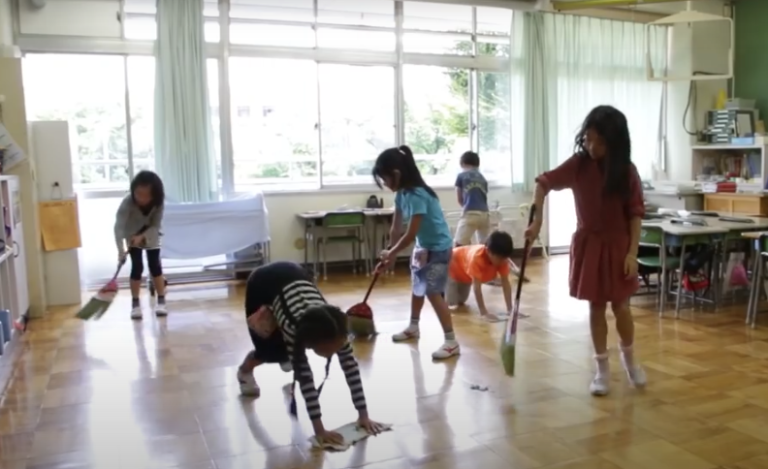T.H.E. Targeted Home Education
Homeschool Renamed, Re-envisioned, and Given a New Way Forward
by Bob Doman

I have been an advocate of homeschooling and home-based educational, developmental/therapeutic intervention for close to fifty years. The whole foundation of NACD (The National Association for Child Development) is built on development, health, education, and where needed, therapeutic intervention, all centered and accomplished within the home. Our philosophy is based on children needing very targeted input, provided with an understanding of neuroplasticity, which essentially means that we need to provide very specific, targeted input with the needed frequency, intensity, and duration to produce the desired results. I also learned that the people who know the child best are typically the best people to work with the child. Furthermore, parents tend to work with their child with a different intention than anyone else. A parent works specifically to help their child, their whole child, whom they know and understand. The intentions and the goals are very straightforward: “I am doing this to help my child, to help them be all they can be.” The most dedicated others generally have a different intention and goal. Their intention is generally to apply the methodologies they are given or are using to the best of their ability, and their goal is to do their best job. This is not a bad intention or goal; however, a parent’s intention leads to them changing and modifying what they are doing if their goals are not being met.
Having started my career first teaching, then directing, schools, I learned what could and could not be accomplished in a school-based rather than a home-based program. I understood that the further we got from the input being targeted to the individual, the less effective the intervention. I learned that targeted input requires a very large toolbox and that many, if not most, educators utilize an approach which they are required to use, regardless of outcome.
Home is a child’s base, the place where the experts on the child live, the place where the whole child is understood. It is the place that is most vested in the child and in helping the child grow into a complete adult, the place that nourishes the child physically and spiritually and provides unconditional love.
Having been an advocate of homeschool throughout my career, I have determined that it is now time to eliminate homeschool. It’s time for a paradigm shift.
Home-Based Education (a.k.a Homeschool)
Home-based education, a.k.a. “homeschool,” is where education first began and, in fact, where education still begins for almost all children. However, in their attempt to provide their children with a better educational opportunity than afforded by schools, many parents have recreated in the home many of the same issues that are problematic and associated with school. Perhaps part of the problem lies simply in their attempting to create a “homeschool”, a school within the home rather than develop an individualized, targeted, home-based education. It’s time to stop turning the incredible potential we have with home education into mini institutions following a failed model.
Schools are institutions, places where many individuals are grouped together generally by age, subjected to narrow competition, which tends to undermine confidence, damage emerging self-images and self-esteem, and deprive them of their unique individuality. These institutions utilize a curriculum, created by “experts,” who neither know, nor care to know, your child or your family and your values, visions, and dreams. This curriculum is a very specific list of what is going to be taught to every individual in an inane attempt to “educate” everyone a little, have everyone think alike, if permitted to actually think at all, regardless of their interests, talents, learning abilities, individual knowledge bases, or family values. The issue with curriculum-based education has been exacerbated by the Common Core curriculum guidelines, which appear to be based on an untenable perspective of what and how children should learn.
Schools have the ability and potential to take preschool children who love learning everything and after twelve years destroy their joy of learning, curiosity, creativity, and individuality and teach them to hate learning everything. From a neurodevelopmental perspective and an understanding of the very nature of a child, school does virtually everything wrong. Basing education on a curriculum, rather than the individual, is the underlying evil of mass education; but it is an anathema that not only does not recognize our individuality, but flies in the face of virtually everything we know about learning.
From my neurodevelopmental perspective, children develop at very different rates globally. The key ingredients of this development that are significant for education include the development of short-term memory, working memory, and executive function, as well as the ability to visualize (think in pictures) and conceptualize (think in words) and to develop the vocabulary needed for complex thought and expression, all of which create the foundation that is the individual learner/child. Each individual is unique, with not only unique needs, but also unique skill sets and interests. Our strength as a species lies in our individuality.
Schools almost universally perceive children as they enter school as fait accompli, with unchangeable intelligence and working memory, who just need curriculum poured into them. The expectation is that each individual will absorb some percentage of what is provided. The perception is that there are smart kids, not-so-smart kids, slow kids, and those with a variety of innate essentially unchangeable issues. These children with various potentials will each learn what is “appropriate” based on the equipment they arrived with. Those perceived as having learning issues, attention problems, or developmental issues are labeled and categorized and provide the school with a license to fail. “It’s not the school’s fault Johnny can’t read, he’s dyslexic.” Many terms such as dyslexic or ADD or ADHD are merely symptomatic labels and not a reflection of some incurable, inherent problem.
Education should be based on the individual and, first and foremost, the development of the neurodevelopmental pieces that actually permit us to perceive, process, understand, communicate, develop, learn, and function as human beings. Children neurologically develop; they begin life barely able to perceive or understand the sights, sounds, touches, tastes, and odors that their sensory systems are sending to their brains. The process of learning how to see, hear, feel, taste, and smell develops through stimulation and opportunity. The more stimulation and the greater the opportunities, the faster these abilities develop.
Memory & Its Role in Education
The primary mental functions that determine how well we take in information and think or manipulate input is our auditory and visual short-term and working memory. These foundational pieces develop fastest in our first five years. Then they typically progress slowly until we are about ten, when without targeted intervention they show little to miniscule advancement into our twenties, and then begin a slow decline. The early rapid growth is a reflection of a brain that starts off seeking input and sucking in whatever is available. The recognition of the importance of this was the impetus that triggered the Head Start program in 1965. Head Start was and is helpful for children in deprived homes who lack quality input. However, the institutions have done what they do best—they have institutionalized children’s incredibly important early years. Proactive, involved and responsible parents have been told that they are not qualified to provide for their children and that not sending them to a preschool institution is virtually child deprivation. Nothing could be further from the truth. For a child the best quality input comes from 1:1 interaction with the parents, the people on the planet who know them the best. Every step away from 1:1, the further away we are from targeted, effective input, input that is going to develop the foundational pieces that help us learn and think. To put daycare, nursery, and preschool in perspective, think of this scenario. If a parent needed a baby sitter for an evening and called a friend to see if they could watch their child and were told to bring them over because she was only watching 10-15 other children, they wouldn’t even consider it. Sending your three or four-year old to a class of 10-15 children and realistically thinking that they will not only survive but will learn as much as they could from you if you could be at home with them, is ludicrous.
ADD & ADHD
I see a direct correlation between the increase in children being institutionalized before the age of six and the dramatic increase in ADD and ADHD, which are generally issues related to underdeveloped processing skills—short-term and working memory. Short-term and working memory have historically developed primarily from 1:1 interaction—talking with parents and looking at/reading books with a parent. The institutional “opportunities” are in fact depriving children of the opportunity to develop these foundational skills during these critical years. Those being labeled as ADD or ADHD represent the overall loss of auditory processing, I feel we have experienced with the advent of almost universal early institutionalization of our children.
Building the Foundation
Learning is a process by which we change the brain by offering the child input that is specific to the individual, not to a curriculum. We impact the brain only if that input is targeted and specific to the individual and delivered with the required frequency, intensity, and duration that is necessary to impact and change that child’s brain.
Fortunately, we now have the tools that can provide targeted input to help build these foundational skills throughout childhood and even into and through our adult years. The schools do not work from the perspective of the individual, nor from a perspective that you can foundationally help the child develop. Schools perceive the individual as a member of a group and rarely attempt to provide what is needed to actually target the individual and their needs.
Targeted input is needed to:
- Develop short-term memory, working memory, and higher order executive function, the very foundation of learning, thinking and function; to simply make them smarter and lead them toward developing their real innate potential
- Discover and explore the individual’s interests so as to supply meaningful input that builds brain connections and networks that produce real learning
- Help build each individual’s interests and expand their knowledge
- Offer the opportunity for the child to discover their talents, interests, and passions that hopefully will lead them to productive further education and fulfilling careers.
- Help teach the child their family’s values
- Teach them to love learning and turn them into lifelong learners
- Teach them to love reading and be lifelong functional readers
- Provide the means so that children can read the classics and the great books
- Teach them how to interpret, question, and challenge what is presented to them and to think for themselves
The world is in desperate need of smarter people. Most advancement comes from collective intellects, many people, many brains working together to create the new better technologies. But where are the exceptional brains that can determine what should or shouldn’t be developed or used and how to solve the real problems facing the planet? Watch the news for five minutes and you will realize how much trouble we are in, between the politicians and learning that virtually every day new and easier ways to destroy each other are created, requiring the participation of fewer and fewer people. People around the world are attempting to live and function in spite of their governments and institutions. We need alternatives and options that can create real diversity of thought and not only acknowledge the individual but understand that it is the individual and the diversity of knowledge, experience, and belief that is the human race and that which provides us with a real future.
It is vital that we learn to understand that we all can be much smarter and that we have the tools to make it happen. Defining opportunity for our children needs not only to include, but must be built upon, creating their neurodevelopmental foundation. We can all be smarter. And we all need to be smarter.
One of the great hopes for our future lies with the family, the home, and home-based education. Now is the time to take what has been “homeschool” and rename it and re-envision it. Let’s move away from the replication of the school and curriculum-based education and create unique home-based education, targeted to and for our children.
T.H.E. Way Forward is Targeted Home Education
[space size=”40px”]





